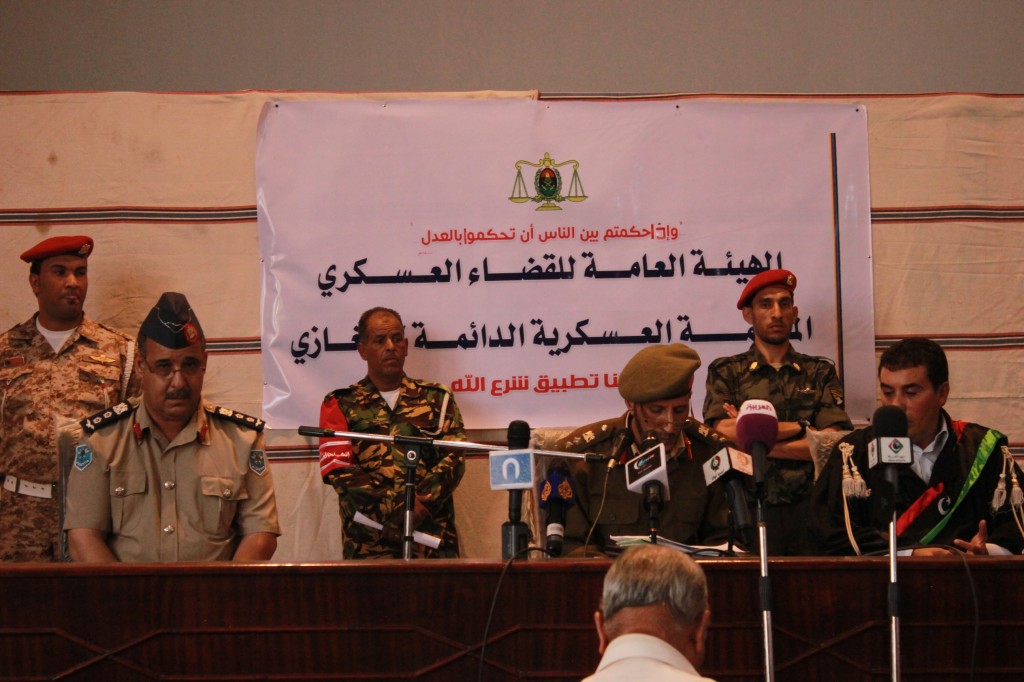By Maha Ellawati and Nihal Zaroug.

(Photo: Maha Ellawati)
Benghazi/Tripoli, 9 November:
Mustafa Abdel Jalil, former chairman of the National Transitional Council (NTC), has been summonsed . . .[restrict]to the Benghazi court after failing to show up to give evidence in the murder case of Abdel Fatah Younis Al-Obeidi, the chief of staff of the Libyan Liberation Army.
Jalil should have attended all three sessions of the trial of Salem Mouftah Mansouri, one of 11 suspects charged with the assassination of Younis and two of his companions Colonel Nasser Moudaker and Lieutenant Mohamed Khamis. However, he failed to appear at any of them.
At the third session when Jalil was called to testify and did not appear, the military prosecutor prompted judge Abdullah Al Saidi to demand that Jalil be summonsed to the court.
Before the session a relative of the late Younis, Mohamed Hamid Al-Obeidi, told Libya Herald that Ali Al Isaawi, the former deputy prime minister in the executive office, was one of five other key figures who have also been asked to appear before the court.
Under questioning, Isaawi confessed that Jalil had issued an arrest warrant for Younis. It was this warrant that led Younis to return to Benghazi from the front-lines. He was then killed in what appears to have been a planned ambush.
As well as Isaawi, Ibrahim Barghati, a member of the preventive security forces, Fawzi Abu Kattif, former member of the 17 February brigade, Jalal Aldgaili, defence minister in the council, and Salem Sheikhi, former minster of religious affairs and endowment were also called before the court. All five men were suspected of being involved in the murder, following previous interrogations.
Younis’ relative Obeidi said that there were several reasons for bringing Jalil before the court, one of which was that he had apparently announced the murder before the body was found. During Jalil’s term as NTC chairman, he did not attend any of the court sessions and, according to Obeidi, there was deliberate stalling of the case.
Jalil had reportedly said he was prepared to appear before the judiciary on the circumstances surrounding the death of the high-ranking military general. In August, during the transfer of power to the General National Congress (GNC), Jalil said that there were members of the NTC who knew what had happened to Younis.
Under preliminary rulings, Salem Al Mansouri, now in custody, was charged with the actual killing. The other ten men were charged with being accessories to murder for their role in the seizure of Younis before his death. None of the defendants were present in the court room and the judge said this was for their own safety as there were concerns that they could be assaulted.
The Obeidi family were displeased with the verdict and protested at the GNC yesterday, vowing to continue seeking justice. Several members of the GNC had promised that the case would be treated as a matter of national priority. However, the trial has, thus far, fallen short of family’s expectations.
There have been reports that in a meeting that took place in Younis’s home on 6 November, family members and heads of the Al Obeidi tribe agreed that if the court did not issue a stern ruling, they would resort to the use of force, as was done by Misrata to Bani Walid over the killing of Omar Shaaban.
Jalil’s whereabouts are unknown, although he is believed to be in Beida.
[/restrict]





